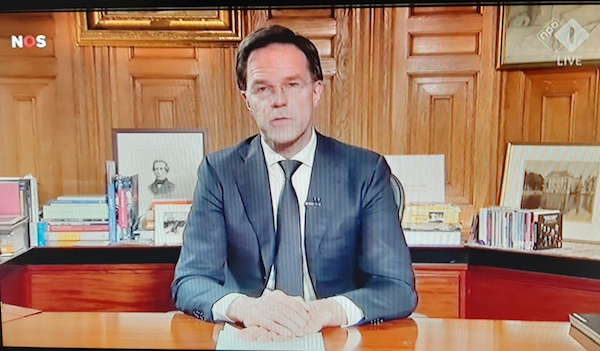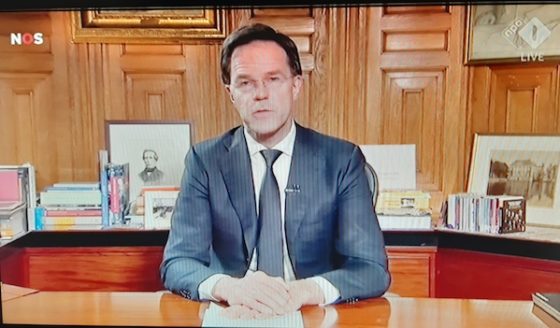We are aiming for ‘maximum control’ of coronavirus, PM tells the Dutch


The Netherlands is adopting a strategy of ‘maximum control’ to deal with the spread of coronavirus, prime minister Mark Rutte said in a televised speech to the nation on Monday evening.
The aim, he said, is to try to spread the peak infection over a longer period, ‘while we build up immunity’. This means that hospitals and intensive care units are not overburdened and they have capacity to help the people most in need, Rutte said.
The rules that the government has introduced to try to stem the virus are ‘unknown in peacetime’, the prime minister said. And in a message aimed at older people and people in bad health, Rutte said: ‘I understand you are worried.’
‘It’s our priority to make the risks for you as small as possible,’ he said. ‘We all have questions: what can I do to protect myself and people around me? Can my birthday go ahead, or my wedding, and why does one country have one rule and another others.’
The answer, he said, begins with the knowledge and the experience of experts. It is, he said, of great importance to be steered by science.
The advice of experts has been leading in all decisions taken since the virus made it to the Netherlands, Rutte said. ‘And it is important that we keep steering by that compass of scientific knowledge and reliable facts.’
Immunity
Many people in the Netherlands will develop the virus in the coming period and the more people who are immune, the less the chance to spread it to the elderly and people with poor health.
‘It will take months to build this up and in the meantime we must protect people,’ Rutte said. ‘Our choice is to go for maximum control, to lower the infection peak and spread it out over a longer period while we build up immunity and don’t overload hospitals and intensive care departments.’
Another option, to let the disease spread quickly, will put too big a burden on the care system, Rutte said. ‘We must avoid this at all cost,’ he told his television audience. The third option, to close down the country and try to keep it out, will take months or longer, with all the consequences which that will involve.
Rules
‘The duration of the measures and whether we need more, depend how the virus reacts,’ Rutte said. ‘Some rules might be made more flexible. We will watch and keep a finger on the pulse in the coming months. We will take the measures necessary and let normal life go on as much as possible.’
Rutte also spoke directly about the economic consequences of the shut-down. ‘Many people are worried about their jobs. Many businesses have their backs against the wall,’ he said.
‘My message to the workers of the Netherlands is that the government will do everything it can to support you so that your business doesn’t fail and you don’t lose your job. It will be difficult but, we won’t let you down.’
‘Finally I want to thank everyone in the Netherlands for how they have followed the rules so far and for how they have helped each other,’ the prime minister said.
‘Stay alert and follow the advice, even if you are strong and healthy. Listen to the experts, help while you can. This is a time when we have to find each other, to put the communal need above our own needs.
‘Cleaners, nurses and doctors in hospitals, ambulance staff and other emergency staff – to them and all who stay at their posts, in schools, day care centres and supermarkets, I want to say: you are doing fantastic work. Thank you.
‘The challenge we are facing is big and together we will get through this difficult period. Take care of each other. I’m counting on you.’
The last time a Dutch prime minister directly addressed the Netherlands on television was in the 1970s during the oil crisis.
Thank you for donating to DutchNews.nl.
We could not provide the Dutch News service, and keep it free of charge, without the generous support of our readers. Your donations allow us to report on issues you tell us matter, and provide you with a summary of the most important Dutch news each day.
Make a donation